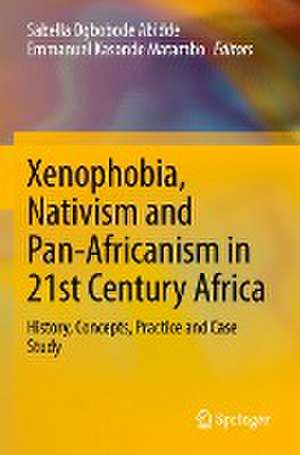Xenophobia, Nativism and Pan-Africanism in 21st Century Africa: History, Concepts, Practice and Case Study
Editat de Sabella Ogbobode Abidde, Emmanuel Kasonde Matamboen Limba Engleză Paperback – 16 dec 2022
Section One discusses the history of colonialism and apartheid and their relationship to xenophobia. Section Two critically evaluates Pan-Africanism as a concept and as a practice in 21st century Africa. Section Three presents case studies on xenophobia in contemporary Africa. Section Four similarly discusses cases of nativism.
Addressing a complex issue incontemporary African politics, this volume will be of use to students and scholars interested in African studies, African politics, human rights, migration, history, law, and development economics.
| Toate formatele și edițiile | Preț | Express |
|---|---|---|
| Paperback (1) | 785.20 lei 6-8 săpt. | |
| Springer International Publishing – 16 dec 2022 | 785.20 lei 6-8 săpt. | |
| Hardback (1) | 790.57 lei 6-8 săpt. | |
| Springer International Publishing – 15 dec 2021 | 790.57 lei 6-8 săpt. |
Preț: 785.20 lei
Preț vechi: 957.56 lei
-18% Nou
Puncte Express: 1178
Preț estimativ în valută:
150.25€ • 163.72$ • 126.61£
150.25€ • 163.72$ • 126.61£
Carte tipărită la comandă
Livrare economică 23 aprilie-07 mai
Preluare comenzi: 021 569.72.76
Specificații
ISBN-13: 9783030820589
ISBN-10: 3030820580
Pagini: 316
Ilustrații: XXXII, 316 p. 4 illus., 3 illus. in color.
Dimensiuni: 155 x 235 mm
Greutate: 0.53 kg
Ediția:1st ed. 2021
Editura: Springer International Publishing
Colecția Springer
Locul publicării:Cham, Switzerland
ISBN-10: 3030820580
Pagini: 316
Ilustrații: XXXII, 316 p. 4 illus., 3 illus. in color.
Dimensiuni: 155 x 235 mm
Greutate: 0.53 kg
Ediția:1st ed. 2021
Editura: Springer International Publishing
Colecția Springer
Locul publicării:Cham, Switzerland
Cuprins
Section One: Pan-Africanism Then and Now.- Chapter 1: The Utility of Pan-Africanism in Africa and the African Diaspora.- Chapter 2: How Relevant is Black Nationalism and Pan-Africanism in the Twenty-First Century.- Chapter 3: Xeno-Afrophobia and Pan-Africanism: What lies beneath the mask of an Identity.- Chapter 4: South Africa’s Segue from Apartheid to Xenophobia: An Analysis Using René Dumont’s False Start for Africa and Frantz Fanon’s Pitfalls of National Consciousness.- Section Two: History in Colonial and Apartheid Eras.- Chapter 5: African History and its Contradictions: Re-thinking the Pan-Africanist Idea of Egyptology in Ayi Kwei Armah’s KMT.- Chapter 6: Colonial Xenophobia and the Fear of ‘Foreign’ Politics in the Nineteenth-Century Cape Colony.- Chapter 7: Apartheid Segregation Laws as an Underlying Instigator of Xenophobia in South Africa: A Critical Reflection.- Chapter 8: A Theoretical Understanding of Xenophobia Through an Invisible Participant.- Section Three: Xenophobiain Contemporary Africa.- Chapter 9: Xenophobic attacks in South Africa: African responses in the context of Pan-Africanism.- Chapter 10: Xenophobia Attacks on Nigerians in South Africa: Counting the Human and Economic Costs.- Chapter 11: Xenophobia, Nativism and Regional Integration in Central Africa.- Chapter 12: Xenophobia in historical perspective: Causation, Consequences and Conquest.- Section Four: Nativism in Africa.- Chapter 13: Three Times a State, Never a Nation: Indians in Rhodesia/Zimbabwe.- Chapter 14: Social media and its role in Nationalistic Influence in Africa.- Chapter 15: Nativism in Nigeria: The Struggle for Ownership and Control of Resources.- Chapter 16: The Politics of Race and Colour in Southern Africa.- Chapter 17: Concluding Remarks: The Specter of Identity Politics against a Pan-African Backdrop.- Index.
Notă biografică
Sabella Ogbobode Abidde is an associate professor of political science and member of the graduate faculty at Alabama State University, US, where he teaches courses in comparative politics, international relations, African politics and institutions, senior seminar classes, and the politics of developing nations. He is a multidisciplinary scholar with regional focus on Africa, Latin America, and the Caribbean.
Emmanuel Kasonde Matambo is the research coordinator for the Centre for Africa-China Studies (CACS) at the University of Johannesburg, South Africa. He received his PhD in political science from the University of KwaZulu-Natal (South Africa). He has published academic articles and book chapters on a range of topics from conflict resolution, contemporary terrorism, educational theory and African agency in international affairs.
Emmanuel Kasonde Matambo is the research coordinator for the Centre for Africa-China Studies (CACS) at the University of Johannesburg, South Africa. He received his PhD in political science from the University of KwaZulu-Natal (South Africa). He has published academic articles and book chapters on a range of topics from conflict resolution, contemporary terrorism, educational theory and African agency in international affairs.
Textul de pe ultima copertă
This edited volume systematically analyzes the connection between xenophobia, nativism, and Pan-Africanism. It situates attacks on black Africans by fellow black Africans within the context of ideals such as Pan-Africanism and Ubuntu, which emphasize unity. The book straddles a range of social science perspectives to explain why attacks on foreign nationals in Africa usually entail attacks on black foreign nationals. Written by an international and interdisciplinary team of scholars, the book is divided into four sections that each explain a different facet of this complicated relationship.
Section One discusses the history of colonialism and apartheid and their relationship to xenophobia. Section Two critically evaluates Pan-Africanism as a concept and as a practice in 21st century Africa. Section Three presents case studies on xenophobia in contemporary Africa. Section Four similarly discusses cases of nativism. Addressing a complex issue incontemporary African politics, this volume will be of use to students and scholars interested in African studies, African politics, human rights, migration, history, law, and development economics.
Section One discusses the history of colonialism and apartheid and their relationship to xenophobia. Section Two critically evaluates Pan-Africanism as a concept and as a practice in 21st century Africa. Section Three presents case studies on xenophobia in contemporary Africa. Section Four similarly discusses cases of nativism. Addressing a complex issue incontemporary African politics, this volume will be of use to students and scholars interested in African studies, African politics, human rights, migration, history, law, and development economics.
Caracteristici
Systematically analyzes the connection between xenophobia, nativism, and Pan-Africanism Discusses the relationship between the politics of othering and xenophobic constructions of foreignness Argues for the continued relevance of Pan-Africanism in contemporary Africa
